Perhaps it’s no great surprise: countries that once ruled vast territories get annoyed when some small parts start expressing a desire for freedom. All the old colonial powers have experienced it and (albeit reluctantly) have divested themselves of those far-off countries they once controlled. Not before plundering their rich natural resources, of course. The most worrying examples of former masters wanting to get back what they’ve lost can be seen in Russia’s cruel and brutal assault on Ukraine, but also in Beijing’s inflammatory attitude to (and comments about) Taiwan. From Beijing’s perspective, Taiwan was, is and should forever remain a part of China; it’s not so much a case of “reunification” as a denial that the island ever split away in the first place, although the split took place way back in 1895. It is a small island, roughly 161 kilometres off the southeast coast of China and not very far from the Philippines, South Korea and even Japan. You may think that it doesn’t count for much in world affairs, but it does. Certainly, from China’s point of view it is “unfinished business”: it’s where the Kuomintang, the former rulers of nationalist China, fled after their defeat by Mao Zedong’s victorious Communist army. But today Taiwan is a huge developer and builder of essential computer and other electronic equipment. More than 50% of the world’s semiconductors are made by one Taiwanese company, the somewhat plainly-named Taiwan Semiconductor Manufacturing Company, TSMC. Last year it was valued at almost $100-billion (€92-billion). Beijing would love to get its hands on such a vital supplier: mainland China only has some 5% of the global market at present.
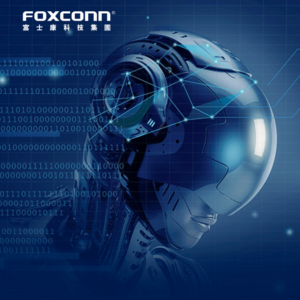
But there’s more. TSMC is also a supplier of advanced computer components to the military in the West. Having an ability to interfere with that work, maybe make an alteration or two here or there, would give Beijing a massive military advantage. It’s doubtful if the United States or the rest of NATO would completely trust computers containing components produced in the People’s Republic, however. Meanwhile, research suggests that more than half of Taiwan’s people consider themselves to be ‘Taiwanese’, rather than Chinese – they have their own language, for instance – although Beijing is utterly convinced that it’s not possible to be ‘Taiwanese’; they’re Chinese, through and through. Research suggests that most of the citizens of Taiwan do not expect military confrontation with mainland China, despite all the warning signs. We should not forget, of course, that most people (myself included) did not expect Vladimir Putin to order his forces to invade Ukraine, but it seems that common sense and the leadership of powerful nations make uneasy bedfellows. As the old saying goes, ‘power corrupts; absolute power corrupts absolutely’, also dulling the senses, it seems. It reminds me of Lady Macbeth’s soliloquy in the eponymous play by Shakespeare: “Make thick my blood, /Stop up the access and passage to remorse, /That no compunctious visitings of nature /Shake my fell purpose.” Very much Putin’s attitude to Ukraine, perhaps?

China consistently denies any intention to reclaim Taiwan militarily, but it continues to rattle its sabres over the island. In April 2022 it sent warships, bombers and fighter aircraft to the area around Taiwan. China’s military command said it was to counter what it called “wrong signals” sent out by the United States. It also claimed that the moves, which included incursions into Taiwanese airspace, were just military drills, but they were conducted during a visit to Taipei by a delegation from the US Congress, to remind them who is really in control here. It was China’s message to the West; the question is: was it the signal or merely the noise? It’s often hard to tell them apart, even in the world of electronics, where the expression first arose. “Distinguishing the signal from the noise requires both scientific knowledge and self-knowledge: the serenity to accept the things we cannot predict, the courage to predict the things we can, and the wisdom to know the difference.” So wrote Nate Silver in his book “The Signal and the Noise: Why so Many Predictions Fail – but Some Don’t”. It’s still true, even in China.
A spokesperson for the People’s Liberation Army, Shi Yilu, told Chinese state media that: “The US bad actions and tricks are completely futile and very dangerous.” He went on to warn that: “Those who play with fire will burn themselves.” It could be a useful warning for the Chinese Communist Party (CCP) too. Most people thought Putin’s warnings were mere sabre-rattling, so it clearly isn’t wise to ignore Shi’s words and there have been a record number of incursions by Chinese warplanes and military ships into Taiwan’s defence zone over the last few months. China’s President Xi Jinping has stated that the “reunification of China with Taiwan”, as he describes it, must be fulfilled. He has not ruled out the use of force, either, to achieve that end.
MISDIRECTED IRE
The United States has reason to be concerned at the prospect, and not only because it buys its computer chips from Taipei. Taiwan is in what Washington calls the “first island chain”, a list of territories that are friendly towards the US and which are therefore vital to American foreign policy. If China took over Taiwan it would be in a position to threaten US military bases as far away as Guam and Hawaii. Even so, and despite urgings from Washington, only thirteen countries recognise Taiwan’s independence. The Vatican does, too, but it lacks warplanes to support its opinions, along with the will to engage in hostilities, of course. Recognising Taiwan is a hazardous business, and most countries only allow diplomatic offices to use the name ‘Taipei’, the Taiwanese capital, rather than Taiwan itself. Little Lithuania broke ranks and permitted the opening of a Taiwanese embassy, but this has caused fury in Beijing. Without announcing – or admitting it – China seems to have imposed trade restrictions that remain in place.
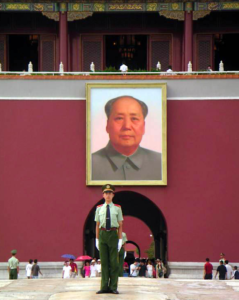
There have been reports of imports from Lithuania held up at customs in China, causing very long delays. It is clearly meant as a warning to other EU countries that Beijing won’t hesitate to interfere with trade relations concerning any country that shows itself sympathetic to Taiwan’s independence. China should, perhaps, recall that not all its decisions, even those that were well intended, have a positive outcome. For instance, in a bid to stop birds from eating the cereals needed by peasant farmers, in the 1950s Chairman Mao ordered them to kill as many sparrows as possible. He had failed to note that sparrows also kill (and eat) insects. Without sparrows as predators, locust numbers soared, and the resulting plague of the creatures destroyed much of China’s rice crop over a very wide area. As Tim Birkhead wrote in his fascinating book, “Birds and Us”: “The resulting ecological imbalance contributed to a famine in which between 15 and 45 million people died: one of the worst human-induced catastrophes ever.” It was the very thing Mao had been trying to prevent, but he was neither an ornithologist nor an entomologist. His intentions had obviously been sound.
Beijing may be the bully in Lithuania’s case but the EU, although not a military power, does have some leverage open to it. Member states could, for example, reduce their diplomatic engagement with China. EU leaders don’t respond well to bullying by large military powers. Putin despises the EU and acts as if it doesn’t exist, but the EU’s economic and diplomatic power is considerable, nevertheless.

As it is, relations between China and Lithuania are now at the level of chargés d’affaires only, the lowest kind of diplomatic relationship. Qu Baihua, China’s Chargé d’Affaires at its embassy in Vilnius, told a press conference that Lithuania had violated the ‘One China’ principle. “We call on the Lithuanian government to acknowledge the mistake and not to underestimate the will and determination of the Chinese people to defend the country’s territorial integrity and national security.” One would imagine that Lithuania (population 2,661,704) would pose little military threat to the security of China (population: 1,453,782,859), but that’s how Beijing sees it. Former Lithuanian Prime Minister Andrius Kubilius, now an MEP for the centre-right European People’s Party (EPP), responded that the mistake is China’s. “We know that China is very sensitive to this,” he told a press conference, “but I think it is time for China to realize that countries have the right to decide on their relationship with the Taiwanese people.” Just as in the case of Mao and his sparrows, Kubilius believes China’s actions may backfire. “China’s pressure, as far as it is now showing towards Lithuania, causes a lot of solidarity and support for Lithuania, both verbally and business-like.”
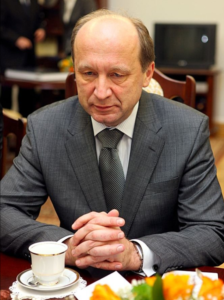
Late last year, a delegation of East European members of parliament visited Taiwan, without making much advance publicity about the upcoming visit. It was led by Matas Maldeikis of Lithuania’s ruling Homeland Union party, who reported that the people of Taiwan now look on Lithuania with increased respect. The Lithuanians have demonstrated in the clearest way that they have the courage of their convictions. He also noted in an interview on Lithuanian TV that confrontations between authoritarian and democratic regimes in the world are becoming more frequent. He said that Lithuania is “on the side of democratic forces”, adding that: “The more authoritarian regimes there are around us, the stronger they are, the greater the threat to our country. It is simply in our national interest to support democracies wherever they are in the world.” That’s not the view of opposition politician Dainius Gaižauskas of the opposition Farmers and Greens Union, who pointed out that it would have easier (and economically safer) to simply call it the Taipei representation, leaving out the word “Taiwan”. One can readily see that he has a point. It’s not a point that would have been appreciated, perhaps, by Qu Baihua, China’s Chargé d’Affaires at its embassy in Vilnius, whom we met earlier. But it’s interesting to note that the Chinese embassy would not permit TV journalists and cameras at his press conference. Clearly, China is trying to send a message, but it’s somewhat ambiguous, and could be mere noise. In the old Western movies, Native Americans communicated using smoke signals, but if the recipient sees smoke, how is he to know if it means “the cavalry are coming” or “hurry home, our camp is on fire”?
FREE TRADE, BUT WITH CONDITIONS
The EU can deploy sanctions to defend its own producers against deliberately harmful dumping. In April 2022, for instance, the European Commission imposed anti-dumping measures on imports of Chinese-produced graphite electrodes. It followed an investigation into the prices being demanded, which proved to be well below what EU producers could match, suggesting a deliberate ploy by China to put them out of business.
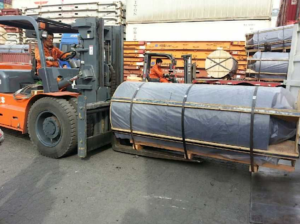
Graphite electrodes may not sound very exciting in terms of grabbing the headlines, but the Commission insists that they are. An article on the Commission’s own website explains: “Graphite electrodes are used in steel production and are an essential component for the world’s recycling industry, since they are the only product that can conduct the power and withstand the heat necessary to melt scrap metal.” Impressive, but also valuable? Oh, yes: “The EU market for graphite electrodes is worth €765-million.” Much the same sort of situation arose over imports of Chinese calcium silicon. An investigation by the Commission found that Chinese imports “are being substantially dumped on the EU market, as a result of which the Commission will impose duties ranging between 31.5% and 50.7% on imports of Chinese calcium silicon.” The EU’s calcium silicon industry is based in France and Slovakia, but it was being damaged by these dumped imports from China, which is why the Commission stepped in to support continued production of calcium silicon in the EU. The Commission website explained that: “Ferroalloys like calcium silicon are essential for the production of special steels and as such are an important element of the steel production chain and of the EU’s economic sovereignty.”
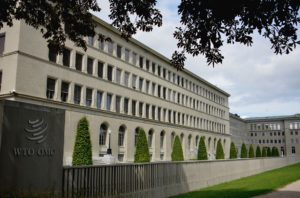
As is clear, China doesn’t always win in these trade confrontations, although it has expressed its displeasure at EU ‘interference’ in its trade policies. The EU’s trade defence measures are based on rules set by the World Trade Organisation (WTO) and have been tailored to allow small and medium-sized businesses to bring actions against overseas competitors who break the rules on subsidies and dumping, to the detriment of European companies. Which brings us to the EU-China Comprehensive Agreement on Investment (CAI), currently frozen in a vote at the European Parliament after China sanctioned
five members of the European Parliament, three members of national parliaments, two EU committees, and several China-focused European academics for criticising China’s human rights record, as well as its actions against the Uighur people in Xinjiang province and against the democratic opposition in Hong Kong. Beijing accuses those it has named of interfering with China’s ‘internal affairs’.
It’s an unfortunate choice of phrase, seeming to argue that China has the right to torture or sterilise people and force them to carry out unpaid work without anyone having the right to say: “stop!” The Chinese government called on Brussels to “immediately stop interfering in China’s internal affairs”. It also said Brussels must abandon its “confrontational approach”, apparently unaware of the notion that human rights extends beyond national borders and is not just the business of the country where the abuses are taking place. The defence of people’s rights is a truly international notion these days, not “an internal affair”. Regardless of this, and Beijing’s awareness of it (one imagines), Zhao Lijian of China’s Foreign Ministry, said: “The unreasonable sanctions imposed by the EU have led to difficulties in China-EU relations. That is what China does not want to see, and the responsibility does not lie with the Chinese side.” Of course, China could just stop mistreating its citizens and start respecting their human rights, which would solve the problem, but it seems very unlikely that they ever will. In a statement, Zhao said he hoped that “the European side will move in the same direction as us, with less emotional outburst and more rational thinking.” So that’s the view from Beijing: to care about human rights and the savage mistreatment of men, women and children is simply an emotional outburst, in need of suppression. The view from the European Parliament is somewhat different, as you might expect: “While the EU’s sanctions target human rights violations and are based on legitimate and proportionate measures embedded in international law,” MEPs wrote, “China’s sanctions lack any legal justification, are entirely unsubstantiated and arbitrary and target the criticism of such human rights violations.”
SLOW TO CHANGE
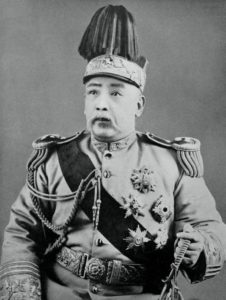
Chinese governments down the years have been noted for several things, such as ingenuity, artistic endeavour, originality, even spiritual thinking (remember Buddhism, Taoism and Confucianism), but seldom for gentleness or kindness. Certainly, imperial China would have provided a stiff and unbending environment in which to live and raise a family. The removal of the emperors came, for most people, as a relief. But the regime that (eventually, after several false starts) replaced them was not noted for its kindness, either. Only the very oldest citizens are likely to recall that the Kuomintang were neither a gentle nor a very popular government; few tears were shed when Mao’s forces drove them out back in 1949. The name ‘Kuomintang’ translates as ‘China’s National People’s Party’, although the party was seen to favour the rich and powerful over the working people beloved of Mao Zedong and his Communists (at least in theory). After overthrowing the Qing dynasty, the Kuomintang appointed Yuan Shikai as the first President, but he abused his powers, sparking a second revolution that failed. He declared himself Emperor of China but died in 1916 (again, few tears were shed) and in the ensuing vicious squabbling of small parties led by warlords, China effectively broke up before Japan invaded and took over the eastern half of the country. When the Kuomintang fled to Taiwan, it was the government, military and hundreds of thousands of business people who followed them, not the ordinary citizens, who were, in the main, still struggling to survive.
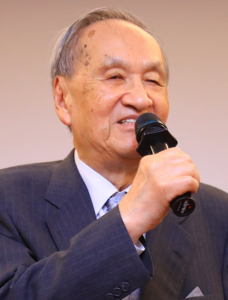
A hero of Taiwanese independence, Peng Min-min, who died this April at the age of 98, was an unlikely standard bearer for the struggle against Chinese aggression. Peng was born on the island, still known then as Formosa, but was more interested in reading than politics (although he also had a passion for baseball) and only became involved because he saw no other option. Taiwan had been ceded ‘in perpetuity’ to Japan by China’s imperial government in 1895, without reference being made to the island’s inhabitants, of course. Peng studied law and political science, at which he excelled, even gaining a place at a university in Japan. Not everything went his way: he lost his left arm when American bombers hit a ferry on which he was travelling. Taiwan was returned to China at the end of the Second World War by the victors, but under the leadership of Chiang Kai-shek of the Kuomintang. Chiang’s soldiers were a rapacious rabble, inclined to beat, rape and otherwise mistreat the ordinary citizens. Taiwan’s nationalist rulers also spouted nonsense about “reclaiming” mainland China, which could never happen, although they continued to espouse the policy. The Kuomintang arrested Peng for writing a manifesto about self-government and he was given an 8-year jail sentence.

This was later changed to house arrest and he escaped abroad. He eventually returned to Taiwan and although never selected to lead the country, much of his manifesto has been realised, although not – of course – that Taiwan should gain its own seat at the United Nations. The Communist leadership in Beijing still struggles to prevent Taiwan’s nationhood from being recognised anywhere. That’s how little Lithuania fell foul of China’s prickly temper. Beijing does not tolerate disagreement or criticism, however well-deserved. Stating that one disagrees with such things as torture, forced sterilization and forced labour will land you with sanctions. A visitor from outer space might conclude that Beijing actually demands the right to carry out such abuses, whilst in point of fact it simply denies they take place.
Dialogue between the two sides has restarted, but cautiously. It’s been claimed that President Xi Jinping appeared to be upset, accusing the EU of being emotional, irrational and on a short leash held by Washington. In defiance of international protocol and normal diplomatic behaviour, China even released its own read-out of the summit before it ended, in an apparent bid to sway the outcome. The hopes of EU negotiators that Beijing could be persuaded to be more constructive in its dealings with Europe were swiftly dashed; they no longer view China as a responsible or even credible partner. There are fears, too, that Xi Jinping may be leaning more towards Vladimir Putin, who can be said to take a somewhat “direct” approach to international relations. China’s overreaction to any comments it views as “hostile” (which includes anything other than outright praise, it would seem) is now recognised as a negotiating tactic, related to the technique of schoolyard bullies: “give me your ice cream or I shall kick your head in”.
OVER-REACTION, UNDER-APPRECIATION
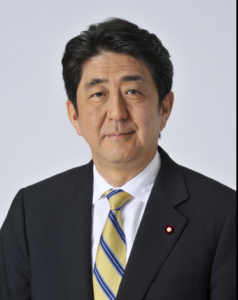
That would explain China’s extraordinary response to an article written by Shinzo Abe, the former Prime Minister of Japan, for the Los Angeles Times, in which he likened to situation in Taiwan to that of Ukraine and urged the United States to pledge that it would defend both. China’s Consulate General in Los Angeles called the comments “irresponsible”. “This serves only to instigate confrontation between major countries,” wrote Consul General Zhang Ping. “The situations in Taiwan and Ukraine cannot be compared,” Zhang wrote. “Taiwan is an inalienable part of China, where the People’s Republic is the sole legal government.” He went on to put the blame for tension firmly on Taipei’s shoulders: “The root cause of the tension in the Taiwan Strait is that the Taiwan authorities refuse to recognise the One-China principle.” He then seeks to spread the blame to other Western countries: “Some external forces have condoned and abetted the growth of separatist forces for ‘Taiwanese independence’.” It’s worth noting Zhang’s use of apostrophes around the expression “Taiwanese independence”. Zhang pledges strong measures against “foreign interference” on behalf of the secessionist activities of what he refers to as “a handful of ‘Taiwanese independence’ separatists.” China has never been noted for listening to the voices of the people, so if he seriously imagines that only a “handful” of Taiwanese want to remain independent, he is either mistaken, misinformed or being somewhat economical with the truth.
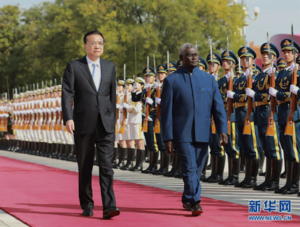
Meanwhile, China continues its bid to increase its own influence in the region, for instance with the Solomon Islands, with which Beijing has recently signed a security pact. This has not gone down well in Japan. According to Japan’s Foreign Minister, Yoshimasa Hayashi, a senior Japanese official has voiced his country’s concerns to the Prime Minister of the Solomon Islands, Manasseh Sogavare, during a meeting there. Sogavare explained to Japan’s Vice Foreign Minister, Kentaro Uesugi, that the move was in line with the Solomon Islands’ refusal to allow China to build any military bases there, although according to Beijing’s version of events, the deal allows China to deploy forces and dock vessels in the islands. Until 2019, the Solomon Islands had diplomatic ties with Taiwan, but it then switched them to China. Details of the new pact have not been published at the time of writing, but according to the Japanese newspaper, Mainichi, Kentaro Uesugi had warned that the deal “could affect the security of the whole Pacific region”. Japan is monitoring developments “with concern”, he said. Given the history of Sino-Japanese relations, that is hardly surprising. As reported in Australia’s The Age newspaper, the family of an Australian man whose courage helped defeat the Japanese during the Second World War are furious that this pact has been allowed to go through.
Scottish-born Martin Clemens stood bravely against the invasion forces of Imperial Japan while he was working as a civil servant on Guadalcanal, which is the main island in the Solomons group. He was a District Officer for the British colonial administration, and when others fled before the might of Japan, he stood his ground, even after the fall of Singapore and the Japanese attack on Pearl Harbour.

Just 25 years old, he worked with the local islanders and carried around a massive radio of considerable size and weight (it took four men to lift it) to radio Japanese activities to the allies. When his batteries ran flat, he refilled them with citric acid extracted from pineapples. The island was seen as a vital staging post and, just like the Chinese today, Japan wanted it. Helped by islanders, Clemens continued to send vital intelligence to the American marines, helping them to prevent the creation of an airbase, but always crediting the islanders for their bravery and ingenuity. His actions saved the life of a US marine lieutenant who went on to become very famous indeed: John F. Kennedy. Clemens was honoured by the US, the UK and his eventual adopted country, Australia. Kennedy’s daughter, Caroline, is convinced her father owed his life to Clemens. Surviving members of Clemens’ family are furious about the Chinese security pact. Martin Clemens would have regarded today’s China much as he did Imperial Japan. The pact would have upset him greatly, his descendants believe. The Age quotes Martin Clemens’ daughter, Alexandra, who lives in Melbourne: “I am the daughter of Martin Clemens who valiantly stood his ground on the Allies’ behalf alone on Guadalcanal for years before the US finally arrived in 1942.” Her view of the deal with China is explicit: “To say I am disappointed and dismayed at the decision would be an understatement,” she told The Age. It was a clever trick on Beijing’s part: distract world opinion with some very obvious sabre-rattling over Taiwan and then sneak round the back and pull off a masterstroke some 6,000 kilometres away when no-one is looking.
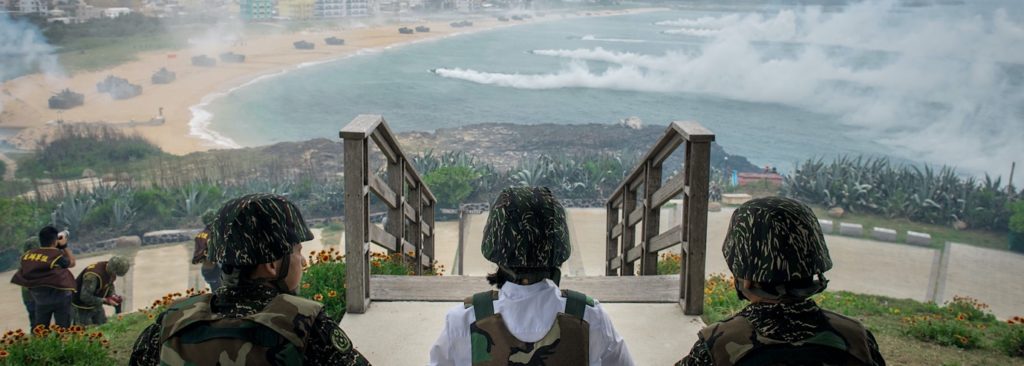
Beijing will not stop there after this tidy little coup; it continues to spread its influence wherever it can. According to Singapore’s The Straits Times: “Singapore has been ranked second in the world – behind Cambodia and just ahead of Thailand – in a study measuring China’s expanding influence on (other) countries”. The newspaper reports that Singapore is especially vulnerable in terms of technology, society and academia, but less so for domestic politics. The report said that Singapore “was found to be especially susceptible to exposure, pressure and effect of Beijing’s influence” in research by the Taiwan-based Doublethink Lab research instititute. The index placed the Philippines in sixth place, Malaysia eighth and Taiwan ninth, with Australia tenth. The United States makes an appearance in 15th place.
World leaders have lately been given an unusual warning from an unexpected source. Reported in the Daily Post: “The Leader of INRI Evangelical Spiritual Church, Primate Elijah Ayodele, has warned of an impending war between China and Taiwan.” He sounds very certain. “Primate Ayodele urged world leaders to be at alert due to the impending war between China and Taiwan.” It comes as no great surprise: while the Taiwanese people – or most of them – still think war with China is unlikely, other people and institutions around the world don’t share their optimism.
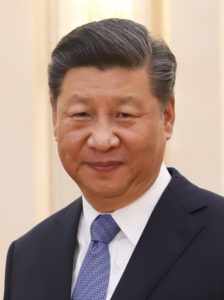
The current situation seems somewhat reversed from when Mao took over in China and the Communists were under threat from the Kuomintang. “The Kuomintang should stay in their own territory and leave us alone,” Mao Zedong told the British writer Robert Payne over dinner in a ramshackle hut in Yunnan, not long after Mao’s ‘Long March’. “They are always committing acts of treachery. Are we supposed to sit back and let them do whatever they please?” Payne asked if that meant that the fighting would continue. “Yes, the fighting goes on,” Mao replied. “The people who are fighting us (the Kuomintang) don’t want democracy at all. There won’t be peace until they learn what democracy is.” Some might argue that today’s leaders in Beijing have either forgotten what democracy is or never learned it in the first place. Would Mao have approved of Xi Jinping? It’s hard to tell. After Mao’s mistake in blaming sparrows for his people’s hunger, then the ghastly debacle of the Cultural Revolution, I’m no longer sure that Mao really knew what he was doing all the time. He was, above all, a revolutionary who wanted to impose Marxism (or at least his interpretation of it) on the Chinese people. An inspirational leader, certainly, but perhaps not a notably successful long-term planner or politician. Xi is almost certainly cleverer than Mao was, but while history will never forget Mao, Xi may, in the fullness of time, slip down the back of the sofa of history and be forgotten. However much noise he may make, it’s far from certain that the signal he’s trying to send, if it gets through, means anything at all.

